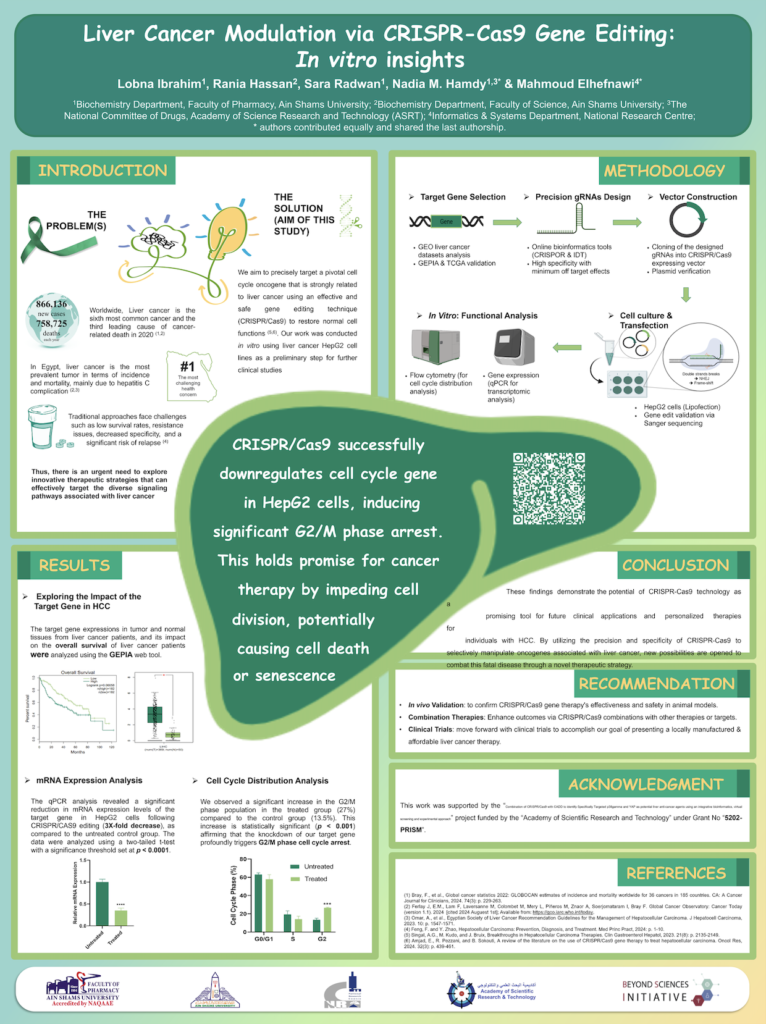Lobna Ibrahim
Egypt
Liver Cancer Modulation via CRISPR-Cas9 Gene Editing: In vitro insights
Lobna Ibrahim1 , Rania Hassan Mohamed2 , Sara Radwan1 , Nadia M. Hamdy1,3* , Mahmoud Elhefnawi4,*
1. Biochemistry Department, Faculty of Pharmacy, Ain Shams University, Abassia, 11566, Cairo, Egypt,
2. Biochemistry Department, Faculty of Science, Ain Shams University, Abassia, 11566, Cairo, Egypt,
3. The National Committee of Drugs, Academy of Science Research and Technology (ASRT), 11566,
Cairo, Egypt,
4. Informatics and Systems Department, National Research Centre, Cairo, Egypt
* authors contributed equally and share the last authorship.
Abstract
Background
Liver cancer, particularly hepatocellular carcinoma (HCC), represents one of the most significant health challenges both globally and locally. In Egypt, HCC is remarkably prevalent due to hepatitis C complications. Current treatments often face challenges such as non-specific targeting, relapse, and treatment resistance. Therefore, there is a pressing need to develop innovative therapeutic strategies that can effectively target various signaling pathways associated with HCC.
Methods
In this study, integrated bioinformatics analysis was used to identify a novel oncogene
associated with hepatocellular carcinoma (HCC). Gene expression datasets were analyzed, and the target was validated using GEPIA and TCGA data. Specific guide RNAs (gRNAs) were designed through CRISPOR to ensure high on-target efficiency and minimal off-target effects. CRISPR-Cas9 constructs were prepared and transfected into HepG2 liver cancer cells. The effects of gene editing were assessed through quantitative PCR (qPCR) for transcriptomic changes and flow cytometry for cell cycle analysis.
Results
Results demonstrated a significant downregulation of target gene mRNA expression by
approximately three-fold (p < 0.0001) in cells treated with CRISPR-Cas9. Additionally, a
substantial G2/M phase arrest was observed in treated cells (27%) compared to controls (p < 0.001), indicating a disruption of the cell cycle at critical checkpoints. These findings underscore the potential of CRISPR-Cas9 technology to selectively target and impair cancer cell proliferation by interfering with essential regulatory mechanisms in cell cycle progression.
Conclusions
This study demonstrates the potential of CRISPR-Cas9 as a precise and personalized tool to
inhibit liver cancer cell proliferation. By selectively targeting oncogenes associated with HCC, it offers a promising approach for precision oncology. This paves the way for innovative therapies, creating new opportunities for targeted and effective cancer treatment.


Leave A Comment